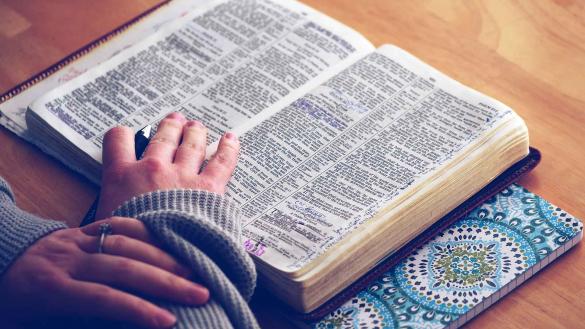Author: Michael Pfundner, 13 April 2020
Our Bible Q&A series explores the questions you’ve asked us about the Bible.
This article represents the author’s personal view. It accords with Bible Society’s values, but is not intended to express our position as an organisation.
Question: How do we reconcile the differences between the four Gospels?
Answer:
As far as we can tell, Jesus left no writings of his own. It was up to his followers to record his deeds and teachings: by word of mouth, and by pen and papyrus.
Most people back then couldn’t read or write. So, telling the Jesus story in the marketplace, the synagogue or around the campfire was the default option as Christians carried the Gospel message across the Jewish lands and eventually the whole of the Roman empire.
The seed of differences between the Gospels would have been sown at this early stage. Picture the apostles telling people about Jesus not long after the events, slightly adjusting their accounts depending on who they were talking to. This was no case of memory lapse or error, but a common storytelling technique in a predominantly oral culture (for a detailed discussion of Gospel tradition in an oral culture, see James Dunn, Jesus Remembered, Eerdmans Publishing Co., 2003). In fact, Jesus would have used it himself; he was on the road for a while, after all, and is unlikely to have worded his teachings in exactly the same way every time, regardless of the context he found himself in.
It is commonly believed that the four Gospels were written roughly one generation after Jesus, in John’s case perhaps even two. But there is evidence within the Gospels themselves that at least parts of the Jesus story were put in writing before then, some of it possibly even during Jesus’ ministry.
In other words, most likely the four Gospel writers had a range of written and spoken Jesus ‘material’ at their disposal. Differences arose depending on the sources they accessed and as each Gospel writer individually arranged and shaped their narrative.
It also looks as though they addressed different types of people, which meant one Gospel writer, say Mark, had to explain certain things to his apparently non-Jewish readers, which Matthew didn’t need to describe to his patently Jewish audience. On the other hand, the abundance of Old Testament references in Matthew wouldn’t have made sense to Mark’s readers, so he could afford to leave them out. The different contexts in, and communities for, which the Gospel writers wrote, account for some of the differences between them.
Scholars, meanwhile, tend to think that Matthew and Luke knew some stories and sayings of Jesus which Mark had no access to. Why else would Mark leave out famous passages like the Lord’s Prayer or the Sermon on the Mount or key doctrinal stories like the virgin birth of Christ?
Another striking fact is that Mark’s Gospel is much shorter than Matthew and Luke, and that nearly the whole of Mark is contained in Matthew and most of Mark is found in Luke. Therefore it is widely assumed that Matthew and Luke had a copy of Mark in front of them when they composed their own Gospel. Luke may be alluding to Mark, alongside other sources, when he writes (my emphasis):
Since many have undertaken to set down an orderly account of the events that have been fulfilled among us, just as they were handed on to us by those who from the beginning were eyewitnesses and servants of the word, I too decided, after investigating everything carefully from the very first, to write an orderly account ... Luke 1.1–3 (NRSV)
Scholars tend to refer to Matthew, Mark and Luke as the synoptic Gospels, which is Greek for having a common view (of Jesus). The fourth Gospel, on the other hand, is in a category of its own. Only about ten per cent of John is also in the other Gospels. John himself points out that Jesus did many other signs in the presence of his disciples, which are not written in this book (John 20.30). It almost feels as though John, whom scholars believe to have been the last to write his Gospel, knew the other accounts and chose not just to focus on different things that Jesus had said and done, but to put them in a new context of rich theological reflection.
So, how do we reconcile the Gospel differences?
Firstly, by recognising them as part of a living and dynamic oral and written tradition, as outlined above.
Secondly, by not confusing difference with discrepancy. At the end of the day, each of the four accounts is ‘good news’ (the meaning of euangélion, the Greek word for Gospel); all four are about a distinctly first century, Galilean Jewish teacher; all are about Jesus, the Messiah, the Son of God; all four focus ultimately on his sacrificial death and miraculous return to life; and all four invite us to trust and follow him today.
Share this:
Have you got a question about the Bible? Let us know and we’ll do our best to answer it!

Whether you're well versed in Scripture or just starting out on the journey, The Bible Course offers a superb overview of the world’s best-selling book.

Bible Q&A: Best verses to memorise?
What are the best ten Bible verses to memorise?

Our Bible Q&A series explores the questions you've asked us about the Bible.